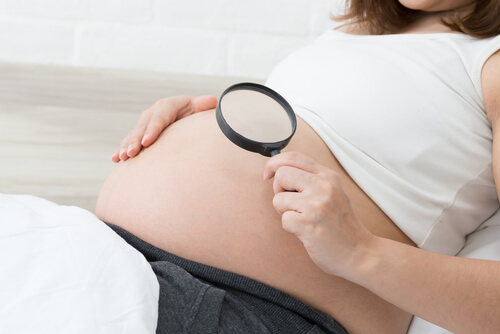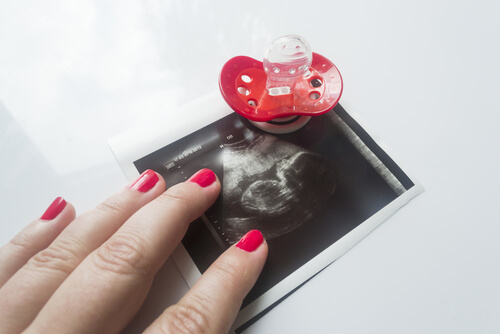Nausea During Pregnancy Could Be a Sign of Your Baby's Sex

Nausea during pregnancy is characteristic of the first trimester and usually disappears during month four (at 12-16 weeks), although not all pregnant women experience it. This also tends to be more common in first-time mothers.
Nausea is an unpleasant sensation which feels like it will lead to vomiting but does not always end in that. This sensation is generally felt throughout the areas of the mouth and throat.
This is a normal symptom of pregnancy, so it shouldn’t be a major concern. Certainly, nausea during pregnancy can be annoying and hinder your daily routine, as it can happen at any time of day.
Causes
- Constipation.
- Psychological factors.
- The size of the placenta.
- High levels of estrogen.
- Low levels of Vitamin B.
- Levels of human chorionic gonadotropin (HCG).
There is no single cause although nausea during pregnancy is usually associated with the high presence of the HCG hormone, which is released by the placenta.
This is the same hormone that is used in a blood test to determine whether a woman is pregnant or not.
Between 50 and 80% of pregnant women experience nausea.

Risk Factors
- Stress.
- Anxiety.
- First pregnancy.
- Headaches/migraines.
- History of gastrointestinal diseases.
- Sensitivity to smells and tastes.
Some studies suggest that women who have been infected with Helicobacter pylori bacteria may have a higher risk of experiencing nausea during pregnancy.
However, this is speculation, as nausea during pregnancy is considered to be a result of many factors and not from a single cause.
Popular Beliefs About Nausea
- If you experience more nausea throughout your pregnancy, you are expecting a girl.
- If your nausea has been mild, the baby may be a boy.
Does nausea give us clues about the baby’s sex?
Recently, as part of a study conducted on a significantly large sample (of about 2 million pregnant women), a group of Swedish scientists found that women who experienced nausea and vomiting in the morning during their pregnancy, had baby girls.
This conclusion was reached after analyzing the results of their testing, where it was shown that in 56% of the cases they studied, the women who dealt with nausea during the first three months of their pregnancy had a girl.
While pregnant women with a more bearable pregnancy gave birth to males.
This study was done at Columbia University in New York City, and specifically refers to women who suffered from hyperemesis gravidarum, which is nausea that occurs 24 hours a day and for more than 12 weeks.

Along with routine examinations, nausea is thought to give clues about the baby’s sex. While there is no definitive evidence of this, continued research is taking place in hopes of providing more information about this.
For now, the most reliable way to know the sex of the baby is through an ultrasound, amniocentesis, or chorionic villus sampling, in which a sample of cells are taken from the uterine wall.
These last two tests are done to determine sex only if the baby is at risk for a gender-related problem.
Ultrasound scans are the most common way to learn the sex of the baby.
It is worth noting that there are babies whose sex cannot be determined through an ultrasound, because during the examinations they are in a position in which their genitals cannot be seen.
Generally, the position that makes it most difficult to tell the sex of the baby is when it is completely facing backwards.
Excessive Nausea During Pregnancy
Women who have hyperemesis gravidarum experience vomiting and extreme nausea during pregnancy. This can cause a loss of more than 5% of body weight and in the most dangerous cases it can trigger dehydration and may even warrant hospitalization.
While this can occur during any pregnancy, hyperemesis gravidarum is considered more likely if the mother is expecting twins.
With the following link you can learn more about treatment and preventative measures for nausea during pregnancy.
Nausea during pregnancy is characteristic of the first trimester and usually disappears during month four (at 12-16 weeks), although not all pregnant women experience it. This also tends to be more common in first-time mothers.
Nausea is an unpleasant sensation which feels like it will lead to vomiting but does not always end in that. This sensation is generally felt throughout the areas of the mouth and throat.
This is a normal symptom of pregnancy, so it shouldn’t be a major concern. Certainly, nausea during pregnancy can be annoying and hinder your daily routine, as it can happen at any time of day.
Causes
- Constipation.
- Psychological factors.
- The size of the placenta.
- High levels of estrogen.
- Low levels of Vitamin B.
- Levels of human chorionic gonadotropin (HCG).
There is no single cause although nausea during pregnancy is usually associated with the high presence of the HCG hormone, which is released by the placenta.
This is the same hormone that is used in a blood test to determine whether a woman is pregnant or not.
Between 50 and 80% of pregnant women experience nausea.

Risk Factors
- Stress.
- Anxiety.
- First pregnancy.
- Headaches/migraines.
- History of gastrointestinal diseases.
- Sensitivity to smells and tastes.
Some studies suggest that women who have been infected with Helicobacter pylori bacteria may have a higher risk of experiencing nausea during pregnancy.
However, this is speculation, as nausea during pregnancy is considered to be a result of many factors and not from a single cause.
Popular Beliefs About Nausea
- If you experience more nausea throughout your pregnancy, you are expecting a girl.
- If your nausea has been mild, the baby may be a boy.
Does nausea give us clues about the baby’s sex?
Recently, as part of a study conducted on a significantly large sample (of about 2 million pregnant women), a group of Swedish scientists found that women who experienced nausea and vomiting in the morning during their pregnancy, had baby girls.
This conclusion was reached after analyzing the results of their testing, where it was shown that in 56% of the cases they studied, the women who dealt with nausea during the first three months of their pregnancy had a girl.
While pregnant women with a more bearable pregnancy gave birth to males.
This study was done at Columbia University in New York City, and specifically refers to women who suffered from hyperemesis gravidarum, which is nausea that occurs 24 hours a day and for more than 12 weeks.

Along with routine examinations, nausea is thought to give clues about the baby’s sex. While there is no definitive evidence of this, continued research is taking place in hopes of providing more information about this.
For now, the most reliable way to know the sex of the baby is through an ultrasound, amniocentesis, or chorionic villus sampling, in which a sample of cells are taken from the uterine wall.
These last two tests are done to determine sex only if the baby is at risk for a gender-related problem.
Ultrasound scans are the most common way to learn the sex of the baby.
It is worth noting that there are babies whose sex cannot be determined through an ultrasound, because during the examinations they are in a position in which their genitals cannot be seen.
Generally, the position that makes it most difficult to tell the sex of the baby is when it is completely facing backwards.
Excessive Nausea During Pregnancy
Women who have hyperemesis gravidarum experience vomiting and extreme nausea during pregnancy. This can cause a loss of more than 5% of body weight and in the most dangerous cases it can trigger dehydration and may even warrant hospitalization.
While this can occur during any pregnancy, hyperemesis gravidarum is considered more likely if the mother is expecting twins.
With the following link you can learn more about treatment and preventative measures for nausea during pregnancy.
All cited sources were thoroughly reviewed by our team to ensure their quality, reliability, currency, and validity. The bibliography of this article was considered reliable and of academic or scientific accuracy.
- Di Loreto, S. (2005). Prevalencia de náuseas, vómitos, antojos y aversiones en embarazadas del Hospital Escuela Eva Perón (Doctoral dissertation, Universidad de Belgrano. Facultad de Ciencias de la Salud.). http://190.221.29.250/bitstream/handle/123456789/76/127_di_loreto.pdf?sequence=1&isAllowed=y
- D’Onofrio, S. La bebida más antigua del mundo. La manipulación simbólica de la leche en el sur de Italia. Estudios Hombre, 15. http://www.publicaciones.cucsh.udg.mx/pperiod/esthom/pdfs/31_Modos_de_beber.pdf#page=11
- Pineda, M. A. G. (2000). La concepción del cuerpo humano, la maternidad y el dolor entre mujeres mayas yukatekas. Mesoamérica, 21(39), 305-332.
- Chura Sillo¹, S. (2016). Aplicación informática para predecir el sexo fetal intrauterino y su desarrollo. Fides et Ratio-Revista de Difusión cultural y científica de la Universidad La Salle en Bolivia, 12(12), 167-191. http://www.scielo.org.bo/pdf/rfer/v12n12/v12n12_a10.pdf
- Silva, C. (2006). Hiperemesis gravídica. Revista de Obstetricia y Ginecología de Venezuela, 66(3), 178-186. http://ve.scielo.org/scielo.php?script=sci_arttext&pid=S0048-77322006000300008
This text is provided for informational purposes only and does not replace consultation with a professional. If in doubt, consult your specialist.








